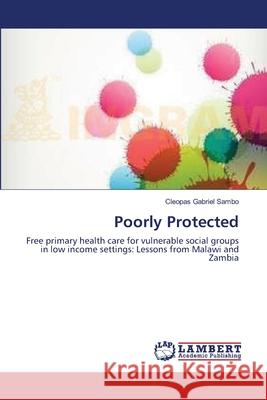Poorly Protected » książka
Poorly Protected
ISBN-13: 9783659395857 / Angielski / Miękka / 2013 / 84 str.
Protecting the poor against poor health is a huge task for governments in low income settings. In this book, Cleopas explores the experience of two Southern African nations (Malawi and Zambia) in their efforts to provide cover for the marginalized and maps out the possible solutions to the challenges experienced. Although the two nations take a slightly different approach, the review found that access and utilization of health services have significantly improved in both cases.Coverage of services is however still limited. Services are free in principle but poor households still bear indirect costs and structural factors still threaten household accessibility to services.The analysis also finds the targeting strategies used in delivering services inadequate although the EHP approach used by Malawi appears to yield better results. Consequently, health systems should be strengthened and remote areas targeted. Both governments need to increase social protection budgets and donors should pool support to reduce coordination problems. Also, a quasi-internal market in health care is proposed as a viable option. Further inquiry into the qualitative effects of these policies is necessar
Protecting the poor against poor health is a huge task for governments in low income settings. In this book, Cleopas explores the experience of two Southern African nations (Malawi and Zambia) in their efforts to provide cover for the marginalized and maps out the possible solutions to the challenges experienced. Although the two nations take a slightly different approach,the review found that access and utilization of health services have significantly improved in both cases.Coverage of services is however still limited. Services are free in principle but poor households still bear indirect costs and structural factors still threaten household accessibility to services.The analysis also finds the targeting strategies used in delivering services inadequate although the EHP approach used by Malawi appears to yield better results. Consequently, health systems should be strengthened and remote areas targeted. Both governments need to increase social protection budgets and donors should pool support to reduce coordination problems. Also,a quasi-internal market in health care is proposed as a viable option. Further inquiry into the qualitative effects of these policies is necessary.











